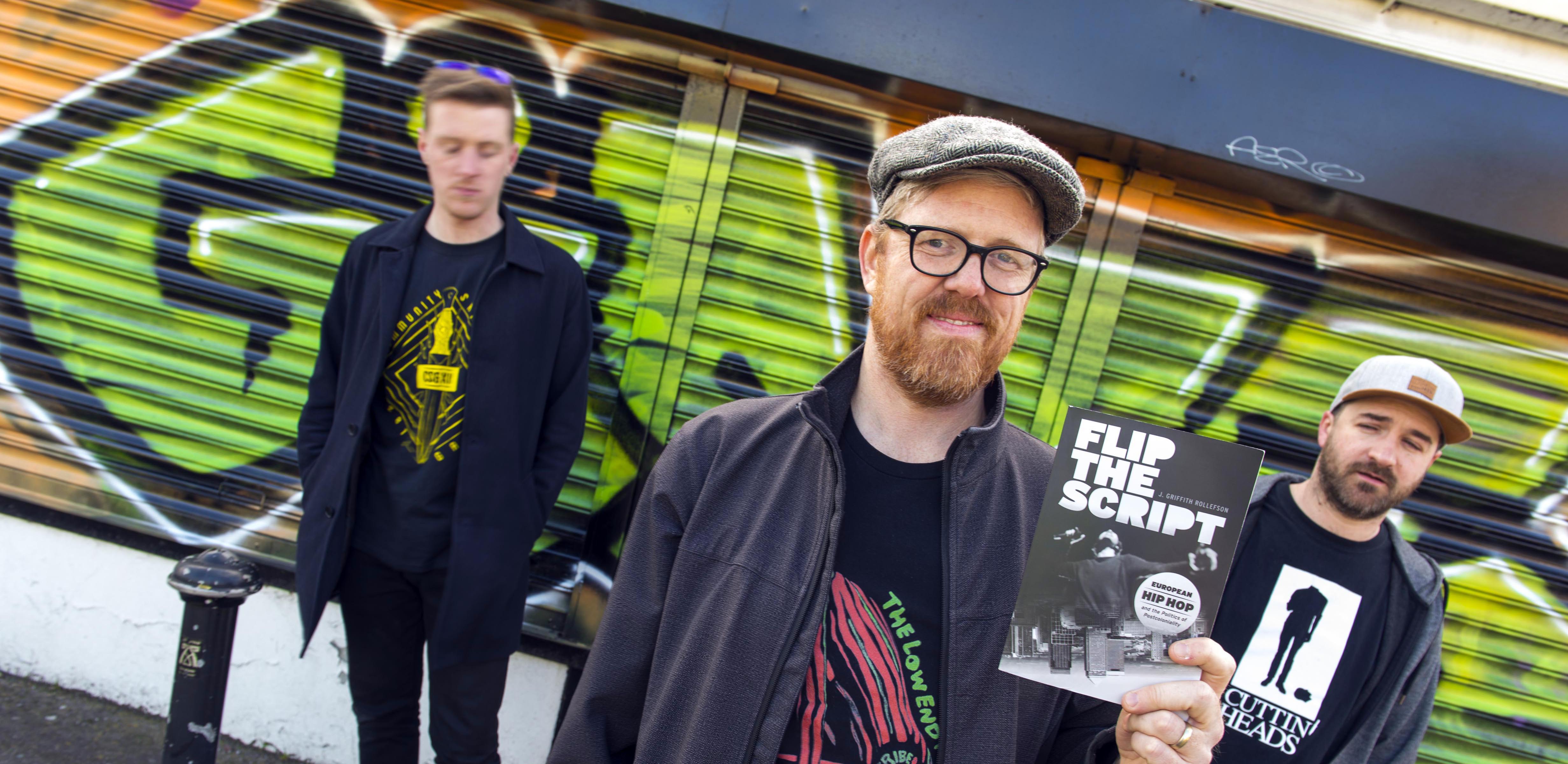Flipping the Script: UCC lecturer to launch first book on European hip hop

From Brexit to Trumpism, global hip hop provides strikingly prophetic commentary on today’s pressing issues, according to a UCC expert in his critically-acclaimed new book.
Global hip hop is a music and culture on the front lines of history, commenting on issues that seem to revolve around the retrenchment of borders and the crossing of red lines that some thought would never be crossed, whether debates about the Eighth Amendment or the walls around Cork’s City Centre, said UCC’s Griffith Rollefson, Ireland's first lecturer in Popular Music Studies.
Rollefson will launch Flip the Script: European Hip Hop and the Politics of Postcoloniality (University of Chicago Press), the first book on European hip hop, in Cork tonight (April 6). In it, Rollefson tracks immigrant voices from France and Germany, to Britain and Ireland, writing, “Never have the continuities between postcoloniality and globalisation been clearer, as Europe faces a post-Brexit realignment and the nations of the world figure out how to liberate goods, capital, and media while limiting the flow of people.”
UCC’s Griffith Rollefson, author of the first book on European hip-hop will be interviewed on @drivetimerte this evening at approx 6.30pm. pic.twitter.com/5M5xqO1W9i
— UCC Ireland (@UCC) April 10, 2018
The point will ring true to fans of last year’s Choice Music Prize winners, Limerick’s Rusangano Family — a trio comprising Afro-Irish rappers God Knows and MuRli and the ethnically Irish DJ My Name is John. In their celebrated hit, ‘Lights On,’ God Knows puts an immigrant spin on the seminal gangsta rap crew name, ‘NWA,’ rapping: “I landed in Ireland in 2001 / About the same time that Dre dropped 2001 / Thirteen later the album’s done / Rusangano presents Non-national With an Attitude, volume one.”
Rusangano’s messages echo the attitude and passion of migrant communities across Europe — communities who know the challenges of the 21st century firsthand, Rollefson said.
“Hip hop addresses issues ranging from international migration and global capitalism to local issues of silencing, such as the anti-democratic push for levy walls around Cork's city centre and the nationwide I Believe Her rallies.”
Thanks @FenaghMahoney for a great interview! Today's @corkindo @ucccreates @UCC @CuttinHeadsCork @ihhforum @TheSource #corkraprenaissance #SpicyBeefRap pic.twitter.com/dQRZMTBPUI
— Griff Rollefson (@cybergriff) April 12, 2018
When Rollefson, a San Francisco native, settled in Cork in 2014, however, he soon realised that ethnically Irish rappers also had their own personal perspectives on postcoloniality. As the nation was busy preparing for commemorations of the Easter Rising in 2016, he witnessed “the ways Irish hip hop artists know all too well how centuries-old colonial structures are echoed in the realms of finance, trade, media, governance, and religion.”
“Indeed, Cork rapper, Ophelia McCabe, and Dublin’s Temper-Mental MissElayneous have been outspoken advocates of women’s rights in the run-up to the Eighth Amendment referendum — literally outspoken!” he said.
At the recent #IBelieveHer rally in Dublin, MissElayneous performed her 2014 track “Abolish ESS,” which includes the lines: “Tired of menstruation being closeted penance / Tired of the mass media and their imposed prison sentence / Tired of being sexually assaulted and mentally maimed / Tired of innocence being slaughtered before it could be stained.”
These are the postcolonial asymmetries and inequalities that Rollefson tracks in his examination of European hip hop. He argues that hip hop is “a form of cultural politics well suited to Flip the Script on those inequalities and help us hear those marginalised perspectives.”
As he shows, just like the classic line “Not bad meaning bad / But bad meaning good!” from New York’s Run DMC, Irish hip hop has localised this script-flipping politics in word and deed — from naming practices like Claire producer Mankyy (whose beats are filthy good) to Rusangano rising to the top of the Irish music industry.
Flip the Script looks at how Irish artists have found themselves in and through this iconic African American music, voicing pride in Ireland's rich history of oppression, diaspora, and revolution – and doing so without resorting to ethno-national chauvinism.
Telegraph Books described the publication as an “engaging and provocative study” that “helps to show how music can outline the cultural dimensions of ethnicity and race in the modern Western world” and the author of the groundbreaking study, The Black Atlantic, Paul Gilroy adds, “At last we have a critical survey that can match the complexity and power of the music.”
Rollefson will launch Flip the Script upstairs in The Roundy, Cork, tonight (Friday, April 6) from 8:30 pm until late. Open to the public, the event is set to feature readings and videos from the author, European and Irish DJ sets from DJ Jus’Me, and live sets from Dublin hip hop legend Costello, Cork mainstay Spekulativ Fiktion, and local up-and-comers from GMC’s Music Generation Kabin crew, Gatch + Pacino Brady.
Best #FlipTheScript interview yet! #ProgressivePopulism #HipHop @UChicagoPress @h2eire @CuttinHeadsCork @UCC @ucccreates @MusicUCC https://t.co/RspxUjslXX
— Griff Rollefson (@cybergriff) April 16, 2018
For details and more information see: https://europeanhiphop.org/
For more on this story contact:
For media queries, contact Lynne Nolan, Media & PR Officer, UCC, at lynne.nolan@ucc.ie or 087 210 1119.
